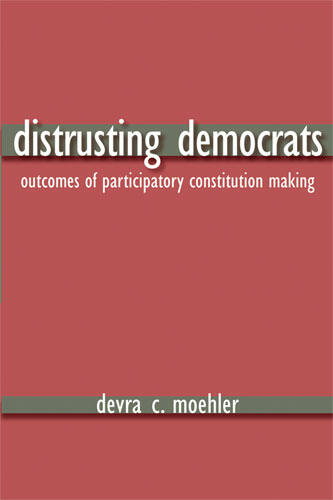Distrusting Democrats
Outcomes of Participatory Constitution Making
Does participation lead citizens of new democracies to invest or disinvest in democracy?
Description
How does mass participation affect political culture in countries undergoing political transition? Distrusting Democrats examines the consequences of citizen involvement in Uganda, one of a growing number of countries employing the participatory model of constitutional reform. Contrary to predictions, author Devra Moehler finds that participation contributes to the creation of "distrusting democrats": citizens who are democratic in their attitudes, but suspicious of their governmental institutions in practice. Moehler argues that participation in developing democracies gives citizens new tools with which to evaluate their imperfectly-performing institutions. Participation raises democratic expectations and alerts citizens to existing democratic deficits. The general implications for constitution-building countries are clear: short-term risks of disillusionment and instability; and long-term advantages from a more sophisticated citizenry capable of monitoring leaders and promoting political development.
Moehler's analysis is based on in-depth interviews, archival research, and a national random-sample survey of 820 Ugandan citizens.
"A gem. This book shows that political participation breeds critical citizenship. A timely reminder that successful democratization must be homegrown."
---Michael Bratton, University Distinguished Professor, Michigan State University
"Moehler draws on extensive original data to make a novel argument about the impact of political participation on democratic attitudes."
---Daniel N. Posner, Associate Professor of Political Science and Director of the UCLA Global Fellows Program, University of California, Los Angeles
Devra C. Moehler is Assistant Professor at University of Pennsylvania and a 2006-7 Scholar at the Harvard Academy for International and Area Studies.
Visit Devra Moehler's website

